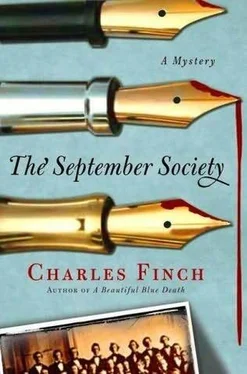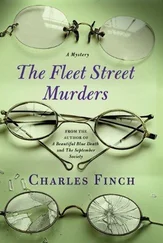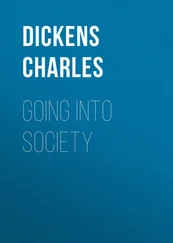Charles Finch - The September Society
Здесь есть возможность читать онлайн «Charles Finch - The September Society» весь текст электронной книги совершенно бесплатно (целиком полную версию без сокращений). В некоторых случаях можно слушать аудио, скачать через торрент в формате fb2 и присутствует краткое содержание. Жанр: Исторический детектив, на английском языке. Описание произведения, (предисловие) а так же отзывы посетителей доступны на портале библиотеки ЛибКат.
- Название:The September Society
- Автор:
- Жанр:
- Год:неизвестен
- ISBN:нет данных
- Рейтинг книги:4 / 5. Голосов: 1
-
Избранное:Добавить в избранное
- Отзывы:
-
Ваша оценка:
- 80
- 1
- 2
- 3
- 4
- 5
The September Society: краткое содержание, описание и аннотация
Предлагаем к чтению аннотацию, описание, краткое содержание или предисловие (зависит от того, что написал сам автор книги «The September Society»). Если вы не нашли необходимую информацию о книге — напишите в комментариях, мы постараемся отыскать её.
The September Society — читать онлайн бесплатно полную книгу (весь текст) целиком
Ниже представлен текст книги, разбитый по страницам. Система сохранения места последней прочитанной страницы, позволяет с удобством читать онлайн бесплатно книгу «The September Society», без необходимости каждый раз заново искать на чём Вы остановились. Поставьте закладку, и сможете в любой момент перейти на страницу, на которой закончили чтение.
Интервал:
Закладка:
The two men had left and were walking along Magdalen Street now, south toward Merton and Christ Church.
“I don’t know how to thank you,” said Lenox. “I’d be nowhere if you hadn’t come up. You’re invaluable, Thomas.”
Presently they came to the slender path that ran inside of Merton (one of the most beautiful of all the colleges, in Lenox’s opinion, more beautiful by far than the ostentation of Christ Church) between the imposing beauty of the chapel, cut through with the strangely evanescent light of its stained glass windows, and the old Mob Quad, the small quadrangle responsible for the shape of Oxford to come-for all universities to come, in fact, the oldest structure of the ancient university. Merton was one of the most interesting colleges at Oxford historically, as well as probably the oldest; it was the only one not to side with the Royalists in the Civil War, and among its early alumni was Sir Thomas Bodley, the namesake of the Bodleian. Lenox relished seeing it again, though too soon the narrow perspective of the path had opened out into the fields of Christ Church Meadow. About two hundred yards away from the rear of Merton was a still-bustling crime scene.
“This looks to be it,” said McConnell, “and there’s Goodson.”
The Oxford inspector spotted Lenox and McConnell just as they spotted him.
“Mr. Lenox,” he said, putting out his hand, “I’m afraid you caught my sergeant at a bad moment yesterday evening. Glad to have you here.”
He was a medium-sized man, brown-haired and freckled, with a look of intensity in his face. There was also honesty there, and in his green eyes a hint of amiability.
“Not at all. It’s a damnable business from top to bottom.”
“If you come this way, you can have a look around.” Goodson motioned for a constable to lift the rope and beckoned Lenox and McConnell inside. “The body was here, sprawled on its back with its arms behind its head. There were footprints all around the area, unfortunately. People tramping around here all day, I’m afraid, and leaving every conceivable kind of shoe mark.”
“Clever of the killer, that,” said Lenox. “A good place to leave the body-or indeed to kill someone-if you have very little time, because it’s completely empty at night and yet still bears the signs of an active thoroughfare.”
“Precisely.”
“Where do you think they came in from, the murdered man and his murderer?”
“Came in from?”
“Where did they enter the park, I mean?”
The meadow was triangular and bound by Christ Church, Merton, and the two rivers. Away from the city of Oxford toward the south end of the park, there was a lower meadow, which sometimes flooded, and past which there were mostly fields.
“We haven’t considered that,” said Goodson.
“Down at the south end, I’d reckon,” said Lenox. “To come from any other direction would have meant either passing porters, students, and dons or else scaling a high fence. But it would have been easy enough to come in over the rivers, and the fields in that direction are empty, aren’t they?”
“I suppose that’s right,” said Goodson dubiously. “You mean they were hiding out just past the rivers there?”
“Exactly. Before yesterday the lads were probably south of here, by the least crowded part of the meadow, but still not that far from Oxford.”
It dawned on Goodson how significant this was, and in unison the three men strode south. When they got there they found the ground less worked over by pedestrians. Goodson beckoned to the crime scene, and two constables came over to see him. There were a few walking bridges over the rivers.
“Look on these bridges here for any marks of struggle-”
“Blood,” said Lenox.
“Blood, yes,” Goodson said.
“I would also recommend sending people south of the city, even farther than here,” said Lenox, “to check in the small hotels and the pubs, the little shops, that sort of thing.”
“I will,” said Goodson, noting it down.
As they walked back, Lenox said, “We should all realize the intelligence it took the murderer to disobey his instincts and return to a more populated area to kill George Payson. Of course, the killer’s first thought would have been to go somewhere remote-but it would have taken time, first of all, to find somewhere so remote that a body would remain hidden for long. He didn’t have time to be that careful.”
McConnell said, “I don’t believe it negates your point, Charles, but it’s worth mention that George Payson was dead before he came to lie here. We also learned from the body that he had been sleeping rough, outdoors, at best in barns or lean-tos. Only his face and hands had been recently cleaned.”
“That makes sense.” Lenox puzzled it over. “I suppose you’d better tell me all about the body, McConnell. But first, let’s look at the place where he was found. We can’t properly call it the scene of the crime, unfortunately.”
CHAPTER SEVENTEEN
A nybody who has ever studied at Oxford loves Christ Church Meadow. With water to one side and the tall, beautiful college spires to the other, it is quintessentially English, almost like a picture by Constable in which water, grass, and a building so old it seems like part of nature itself all breathe against each other. To Lenox, it was most beautiful in the long golden light of springtime, when its green expanse seemed limitless and the soft water sounds of rowers and punters floated on the air, while in the distance cattle grazed in the lower water meadow. The line of boathouses down at one end was a happy place, too, for a day spent punting with friends along the Cherwell, drinking champagne (or champs, as they called it at Oxford) and eating cold chicken, was as close to heaven as this earth could get. A day of punting could erase weeks of dark Bodleian nights from the memory.
But Lenox pushed these memories aside now and concentrated on the site where George Payson’s body had been fifteen hours before.
There were five or six policemen around the roped-off area, as well as another dozen curious passersby. The men from the force were spending their time either classifying footprints or keeping people back from the site. To Goodson’s credit, they had left the scene in good working order, and the imprint of the body was still visible. Lenox noticed that it was slightly deeper toward the middle.
“The person who dropped George Payson’s body must have been carrying him like this”-Lenox demonstrated-“just the way you carry a bride across the threshold, if you see what I mean, and then simply dropped him.”
“I figured as much,” said Goodson rather testily.
“Oh, certainly,” said Lenox. “This has all been done in a first-rate way-a sight better than some I could name from London might have done. I was only straightening the thing out in my own head. That means, then, that the person’s footprints are probably just ten inches to the left of the body-ah, a dense patch, I see,” he said, responding to Goodson’s pointing out the spot. “I really have to congratulate your thoroughness. The only other point to gather here, then, is that Payson must have been newly dead, garroted only a few moments before the killer dropped him here.”
“Why?” Goodson asked.
“Because the arms were splayed out above the head,” said Lenox, pointing to where the arms had left indentations in the soil. “They were still loose. The killer wouldn’t have carried him with his arms like that. Too unwieldy, too easily noticeable. He left the body as it fell. McConnell, how long would rigor mortis have taken to set in?”
“It can take anywhere from five minutes to two hours, but in this case, given how the body has loosened again, probably on the shorter side-call it fifteen minutes.”
Читать дальшеИнтервал:
Закладка:
Похожие книги на «The September Society»
Представляем Вашему вниманию похожие книги на «The September Society» списком для выбора. Мы отобрали схожую по названию и смыслу литературу в надежде предоставить читателям больше вариантов отыскать новые, интересные, ещё непрочитанные произведения.
Обсуждение, отзывы о книге «The September Society» и просто собственные мнения читателей. Оставьте ваши комментарии, напишите, что Вы думаете о произведении, его смысле или главных героях. Укажите что конкретно понравилось, а что нет, и почему Вы так считаете.












